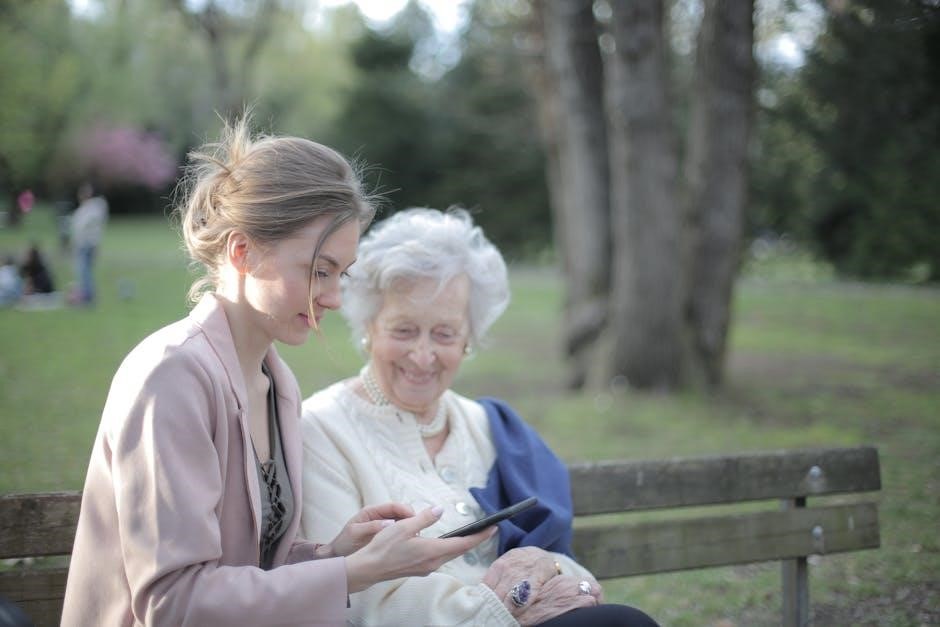
A caregiver’s duties include managing medications, tracking supplements, assisting with daily activities, providing companionship, handling emergencies, coordinating healthcare, aiding with personal care, arranging transportation, and documenting care plans to ensure comprehensive support for individuals in need.

Caregivers play a vital role in supporting individuals who require assistance due to illness, disability, or age-related limitations. Their responsibilities are diverse, ranging from managing medications and supplements to providing emotional support and companionship. Caregivers assist with daily activities like bathing, dressing, and mobility, while also handling tasks such as transportation and errands. They act as advocates, coordinating with healthcare providers and ensuring proper medical care. Additionally, caregivers may take on legal and financial responsibilities, such as managing bills or making informed decisions on behalf of the individual. Creating a detailed care plan and maintaining accurate documentation are essential to ensure consistent and high-quality support. The role requires patience, empathy, and strong organizational skills, as caregivers often juggle multiple tasks while providing compassionate care. Their work significantly impacts the well-being and quality of life of those they support, making their role both challenging and deeply rewarding.
Managing Medications and Supplements
Effectively managing medications and supplements is a critical responsibility for caregivers. This involves creating a detailed list of all prescribed drugs, over-the-counter medications, and supplements the individual is taking. The caregiver must ensure medications are administered at the correct dosage and time, adhering strictly to the healthcare provider’s instructions. They should also monitor for potential side effects and drug interactions, which can be dangerous if left unaddressed. Maintaining an updated medication log is essential to keep track of what has been taken and when. Caregivers should also store medications properly to avoid misuse or expiration. Additionally, they must educate the individual and other caregivers about the importance of adhering to the medication regimen. Regularly reviewing the medication list with healthcare providers ensures that it remains accurate and effective. Using tools like pill organizers or reminder apps can help streamline this process. Proper medication management is vital for maintaining the individual’s health and preventing complications.

Assisting with Activities of Daily Living
Assisting with activities of daily living (ADLs) is a fundamental part of a caregiver’s role. These tasks include helping with bathing, dressing, toileting, and personal hygiene, ensuring the individual maintains dignity and cleanliness. Caregivers also assist with mobility, such as walking or transferring from a bed to a chair, to prevent falls and promote physical activity. Additionally, they may aid with eating, preparing meals, and managing nutritional needs, especially for those with dietary restrictions. Light housekeeping and laundry services may also be part of these duties to create a safe and comfortable living environment. Caregivers should tailor their support to the individual’s specific needs, respecting their preferences and promoting independence where possible. Regularly assessing and adjusting assistance levels ensures the care remains effective and aligned with the person’s changing abilities. By providing reliable and compassionate support, caregivers play a vital role in enhancing the quality of life for those they care for;
Providing Companionship and Emotional Support
Providing companionship and emotional support is a vital aspect of caregiving, focusing on fostering a sense of connection and well-being. Caregivers engage in conversations, share hobbies, and participate in activities that bring joy and comfort to the individual. This helps reduce feelings of loneliness and isolation, which are common among those requiring care. Emotional support involves offering empathy, reassurance, and a listening ear, enabling the person to express their feelings and concerns. Caregivers also encourage participation in social events or outings to maintain social connections and a sense of normalcy. By being present and attentive, caregivers help bolster the individual’s mental health and overall quality of life; This role requires patience, understanding, and the ability to adapt to the person’s emotional needs, ensuring they feel valued and supported throughout their care journey.
Handling Medical Emergencies
Handling medical emergencies is a critical responsibility for caregivers, requiring quick thinking and preparedness. Caregivers must be trained to recognize signs of distress, such as chest pain, difficulty breathing, or severe injuries, and know when to call emergency services. They should maintain a list of emergency contact numbers, including healthcare providers and family members, for immediate access. In the event of a seizure, injury, or sudden illness, caregivers must administer first aid, such as CPR if certified, and ensure the individual’s safety until professional help arrives. Additionally, caregivers should be familiar with the person’s medical history, allergies, and emergency protocols to provide accurate information to responders. Regular training in first aid and emergency response is essential to equip caregivers with the skills needed to manage crises effectively. By staying calm and acting promptly, caregivers can play a lifesaving role during medical emergencies, ensuring the individual receives timely and appropriate care.
Coordinating with Healthcare Providers
Coordinating with healthcare providers is a vital aspect of caregiving, ensuring that the care recipient receives comprehensive and continuous care. Caregivers must maintain open communication with doctors, nurses, and other healthcare professionals to stay informed about the individual’s medical condition, treatment plans, and any changes in their health status. This involves scheduling and attending medical appointments, managing follow-up care, and ensuring that all healthcare providers have access to the individual’s medical history and current treatment details.
- Acting as a liaison between the care recipient and healthcare providers to ensure clear communication and understanding of medical instructions.
- Organizing and managing the care recipient’s medical appointments, tests, and procedures.
- Monitoring and updating the care plan in collaboration with healthcare providers to reflect any changes in the individual’s needs or condition.
- Ensuring that all prescribed medications and therapies are administered as directed and that any side effects or concerns are reported to healthcare providers promptly.
Effective coordination with healthcare providers not only enhances the quality of care but also helps prevent misunderstandings and ensures that the care recipient’s needs are consistently met.

Personal Care and Hygiene Assistance
Assisting with personal care and hygiene is a fundamental responsibility for caregivers, ensuring the individual maintains dignity and health. This includes helping with bathing, dressing, grooming, and toileting, as well as managing incontinence care when needed. Caregivers must be patient, respectful, and attentive to the individual’s preferences and physical limitations.

- Providing support with daily bathing or showering, ensuring the environment is safe and slip-free.
- Assisting with dressing, selecting appropriate clothing, and ensuring comfort and practicality.
- Helping with grooming tasks such as brushing hair, trimming nails, and shaving.
- Assisting with toileting needs, including using the bathroom, managing catheters, or changing adult diapers.
- Ensuring proper handwashing and use of protective equipment to maintain hygiene standards.
Personal care and hygiene assistance requires a balance of professionalism and compassion, allowing the individual to feel comfortable and secure while meeting their essential needs;
Transportation and Errands
Transportation and errands are essential duties for caregivers, ensuring individuals can access necessary services and maintain their daily routines. This includes driving clients to medical appointments, grocery shopping, and social events, as well as assisting with tasks like picking up prescriptions or running other errands.

- Providing safe and reliable transportation to doctor’s appointments, therapy sessions, and other important events.
- Accompanying clients during outings to ensure their safety and provide assistance as needed.
- Managing errands such as grocery shopping, picking up medications, and handling household tasks.
- Helping clients with mobility challenges by assisting them in and out of vehicles.
- Ensuring the vehicle is maintained, with proper insurance and a valid driver’s license.
Transportation and errands require careful planning and time management to ensure clients’ needs are met efficiently and safely, allowing them to maintain independence and quality of life.
Legal and Financial Responsibilities
Caregivers often take on legal and financial responsibilities to ensure the well-being of their clients or loved ones. This includes managing budgets, handling bills, and overseeing financial decisions to prevent exploitation or misuse of funds. Legal duties may involve obtaining power of attorney, making medical decisions, or ensuring advance directives are followed. Caregivers must also stay informed about legal requirements and financial assistance programs to advocate effectively for their clients’ interests.
- Managing daily expenses, budgeting, and ensuring timely bill payments.
- Overseeing financial planning, including taxes, insurance, and retirement funds.
- Obtaining legal documents like power of attorney to make informed decisions.
- Ensuring compliance with legal and ethical standards in caregiving.
- Exploring financial assistance options, such as government benefits or tax deductions.
- Reviewing and managing insurance claims and medical billing.
Legal and financial responsibilities require careful attention to detail and a commitment to acting in the best interest of the individual, ensuring their rights and resources are protected.

Creating a Care Plan and Documentation

Creating a care plan and maintaining thorough documentation are essential duties for caregivers. A care plan outlines the individual’s needs, goals, and the strategies to achieve them, ensuring personalized and effective support. Caregivers must document daily activities, progress, and any changes in the person’s condition to track improvements and identify areas needing adjustment.

- Assessing the individual’s physical, emotional, and social needs.
- Setting realistic goals and timelines for achieving them.
- Recording daily tasks, such as medication administration and ADL assistance.
- Updating the care plan as needs evolve or new challenges arise.
- Maintaining communication logs with healthcare providers and family members.
- Using worksheets or digital tools to organize and share information.
Proper documentation ensures continuity of care, helps in evaluating progress, and serves as a reference for future decisions. Regular reviews and updates to the care plan are crucial to adapt to changing circumstances and ensure the best possible outcomes for the individual.
